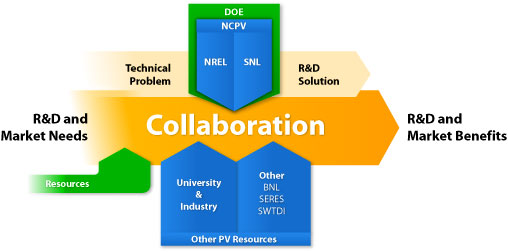NREL Aims to Reduce Solar Energy Costs to $0.06/kWh
The NREL (National Renewable Energy Laboratory) ]is the U.S. Department of Energy's (DOE) primary national laboratory for renewable energy and energy efficiency research and development. NREL is operated for the DOE by the Alliance for Sustainable Energy, LLC.
The National Renewable Energy Laboratory is one of the best sources of R&D financing and information about Solar Research. Supported by the US Department of Energy, it leads the way in helping meet the growing demand for clean energy and has an impressive track record of 33 years of achievement,
The NREL is the only US federal laboratory dedicated to the research, development, commercialization and deployment of renewable energy and energy efficiency technologies.
The lab's capabilities include:
• Research and Development
• Testing and Evaluation
• Deployment
Solar Technologies Overview
The lab is working with the Department of Energy to accelerate the development of solar technologies as energy sources for the USA and world. It does this by supporting the Lab's R&D in two major solar energy technologies — photovoltaic research and solar thermal research, and also by compiling a large database of Solar Radiation information and research.
1. Photoelectric Research
The National Center for photovoltaic research is fully dedicated to meet the long-term goal of achieving $0.06/kWh grid-tied distributed systems. It is working to meet this goal by lowering the cost of delivered electricity and improving the efficiency of PV modules and systems. Their PV research contributes to these goals through fundamental research, advanced materials and devices, and technology development.
Industry, academia, and the National Renewable Energy Laboratory partner to investigate properties and operating mechanisms of cell materials and devices. This teamed research approach works to identify efficiency-limiting defects in cell materials and analyze their electrical and optical properties.

PV R&D emphasizes innovative research, thin-film development, manufacturing R&D, and systems development and reliability. We conduct this research in collaboration with universities and solar industry through research partnerships and direct support of the Solar Program.
For more information about the National Center for Photovoltaics click here.
2. Solar Thermal Research
The National Renewable Energy Laboratory plays a leadership role in analyzing cost and performance of concentrating solar power systems, developing parabolic trough technology for solar electricity generation, and developing advanced technologies such as concentrating photovoltaics. Researchers support the development of new designs and manufacturing processes for solar components and systems with an emphasis on improved performance, reliability and service life.
The lab is also working with the solar industry to lower the cost of solar water heating systems. Laboratory researchers provide assistance with prototype development of new polymer (plastic) systems through modeling and optimization, characterization of the systems' performance, and accelerated materials durability testing.
Solar thermal research is performed in the Electricity, Resources, and Building Systems Integration Center.
Solar Radiation Research
Optimal siting of renewable energy systems requires knowledge of the resource characteristics at any given location. NREL's solar radiation research and data collection is performed at the Solar Radiation Research Laboratory. This unique research facility continually measures solar radiation and other meteorological data and disseminates the information to government, industry, academia, and international laboratories and agencies. These data are used for climate change studies, atmospheric research, renewable energy conversion system testing, and more.
Get More Solar Facts and Advice
To learn more facts and advice about a wide variety of solar related products and issues - use our built-in site & blog searching tool below. We have written more than 700 articles to help you.
Click on this link to return from this page about the NREL back to our Home Page.